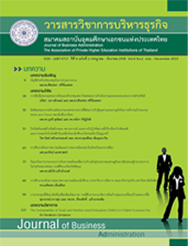การศึกษาระดับความฉลาดทางอารมณ์ของนักศึกษา สาขาวิชาการจัดการ คณะบริหารธุรกิจ มหาวิทยาลัยรังสิต
Keywords:
ความฉลาดทางอารมณ์, นักศึกษา, คณะบริหารธุรกิจ, Emotional Intelligence, Students, Faculty of Business AdministrationAbstract
การวิจัยครั้งนี้มีวัตถุประสงค์เพื่อศึกษาระดับความฉลาดทางอารมณ์ของนักศึกษาสาขาวิชาการจัดการ คณะบริหารธุรกิจ กลุ่มตัวอย่างที่ใช้ในการวิจัยได้แก่นักศึกษาสาขาวิชาการจัดการที่กำลังศึกษาอยู่ในปีการศึกษา 2556จำนวน 265 คน เก็บรวบรวมข้อมูลโดยใช้เครื่องมือคือแบบประเมินความฉลาดทางอารมณ์ของกรมสุขภาพจิตกระทรวงสาธารณสุข จำนวน 52 ข้อ วิเคราะห์ข้อมูลโดยใช้สถิติความถี่ ร้อยละ ค่าเฉลี่ย และค่าเบี่ยงเบนมาตรฐานแล้วทำการแปลผลข้อมูลในรูปแบบตารางประกอบการบรรยายผลการศึกษาด้านข้อมูลทั่วไปพบว่า กลุ่มตัวอย่างส่วนใหญ่เป็นเพศหญิง อายุ 20 ปี กำลังศึกษาอยู่ในชั้นปีที่ 2โดยมีเกรดเฉลี่ยอยู่ระหว่าง 2.00 – 2.49 ได้รับค่าใช้จ่ายต่อเดือนระหว่าง 8,000 – 10,000 บาท โดยเป็นจำนวนที่เหมาะสมพอเพียงต่อการใช้จ่าย ลักษณะครอบครัวส่วนใหญ่คือบิดา มารดาอยู่ด้วยกัน อาศัยในบ้านพักของตนเองสำหรับผลการวิจัยด้านระดับความฉลาดทางอารมณ์ จากองค์ประกอบสำคัญ 3 ด้าน คือ ด้านความเก่ง ด้านความดีและด้านความสุข พบว่า คะแนนความฉลาดทางอารมณ์รวม อยู่ในเกณฑ์ปกติ และเมื่อพิจารณาองค์ประกอบแต่ละด้าน พบว่าผลคะแนนที่ได้อยู่ในช่วงเกณฑ์ปกติ มีเพียงองค์ประกอบด้านความดี ที่สูงกว่าเกณฑ์เล็กน้อย โดยเฉพาะด้านการควบคุมตนเอง ที่มีคะแนนสูงกว่าปกติเล็กน้อย คือ 18.48 (เกณฑ์ปกติอยู่ระหว่าง 13-18) กล่าวได้ว่ากลุ่มตัวอย่างมีการรู้จักอกใจเห็นใจผู้อื่นสามารถยอมรับผูอื้่น และมีความรับผิดชอบในการทำงาน ซึ่งส่งผลต่อความสัมพันธ์ที่ดีในสังคม สามารถเรียนรู้และทำกิจกรรมร่วมกันอย่างมีความสุข ดังนั้นในการจัดกิจกรรมเพื่อพัฒนาคุณลักษณะของผู้เรียนให้เป็นผู้พร้อมความเกณฑ์มาตรฐานการอุดมศึกษา จึงควรส่งเสริมให้เกิดความร่วมมือร่วมใจทำงานเป็นกลุ่มสร้างความรับผิดชอบและสนับสนุนให้มีการแลกเปลี่ยนความคิด รู้จักสังเกตพฤติกรรมการแสดงออกและความรู้สึก ของเพื่อน เกิดการเขา้ ใจในความแตกต่าง และเกิดการยอมรับในกันและกันมากขึ้นและนำไปสู่ความสัมพันธ์ที่ดีในที่สุด
Emotional Quotient of Management Major Students, Faculty of Business Administration, Rangsit University
The purposes of this research was to study the emotional quotient (EQ) level of the Management Major Students, Faculty of Business Administration. Sample size of the study were 265 students in academic year 2013. The research instrument was Emotional Intelligence Screening Test of Department of Mental Health, Ministry of Public Health. The data were analyzed by frequency, percentage, mean and standard deviation. The results of the research can be described as follows; the group of respondents incorporated 63% females and 37% males. The majority of the group were 20 years old (41.1%). An average of the cumulative grade point average was between 2.00–2.49 (50.2%). The study revealed that 32.8% the respondents spent monthly 8,000–10,000 baht. Most of respondents still live with parents (77.4%). With respect to the criteria for measuring the Total Emotional Intelligence (Virtue, Competence, and Happiness), the study found that the scores of competence and happiness aspects are normal. The findings identified that the respondents were understanding and sympathized with other people. They accepted others and were responsible for their work. They also created a good relationship among themselves. Nevertheless, the instructors should provide some useful guidelines or any learning activities for the students in order to satisfy them somehow. Therefore providing educational activities so as to develop the students’ characteristics and readiness in accordance with the criteria of higher education standard are deemed to be important concerns. The instructors should encourage the students’ cooperations and support them to participate in group-activities based learning.
Downloads
How to Cite
Issue
Section
License
บทความที่ลงตีพิมพ์ในวารสารวิชาการบริหารธุรกิจ สมาคมสถาบันอุดมศึกษาเอกชนแห่งประเทศไทยต้องเป็นบทความที่ไม่เคยได้รับการตีพิมพ์เผยแพร่ หรืออยู่ระหว่างการพิจารณาตีพิมพ์ในวารสารอื่นๆ การละเมิดลิขสิทธิ์เป็นความรับผิดชอบของผู้ส่งบทความโดยตรง


